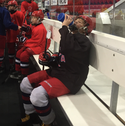A.S. Pavlov,1, A. A. Petrov2
1Proffessional ice hockey club CSKA, Moscow, Russia.
2Russian State University of Physical Education, Sports, Youth and Tourism (SCOLIPE), Moscow;
Annotation. The paper considers the problem of water consumption during training and competitive activities of hockey players. Data on the importance of water as an important component of all biochemical reactions in the body are presented. Analysis of the results of studies on the dehydration of the human body in the process of performing physical work indicates a noticeable decrease in the physical and mental performance a person during dehydration. The paper notes that the loss of fluid and salts during training and competitive work can lead to dehydration and disruption of the water-salt balance of the body. Information is given on the greater efficiency of the assimilation of low-mineralized monostructured water by the human body. The authors stated the need for adequate replenishment of the fluid lost by the athlete’s body in the process of training and competitive activities. It has been proven that the optimal water intake by athletes during work partially (up to 70%) replenishes the loss of body fluids. The opinion of many experts about the inadmissibility of drinking water during the performance of active physical work by athletes has been refuted. Recommendations are given to ensure a good drinking regimen for hockey players.
Key words: ice hockey, training, water, drinking regimen, working capacity, recovery.
Introduction. Despite repeated statements by experts about the need to drink fluids during training and competition [1, 2], many hockey coaches still support the unfounded opinion that an athlete should not drink during training and competitive work. This opinion is deeply erroneous, since during physical activity, sweating increases, which leads to the loss of fluid by the cells and tissues of the body, and their functionality decreases. And this, in turn, leads to a decrease in the performance of an athlete, i.e., the effectiveness of training and competitive activity decreases — fatigue sets in faster and recovery processes slow down [1, 2]. Water is a vital component of all living cells and extracellular fluids. It regulates body temperature, aids in the digestion of food, and helps regulate acid-base balance [5]. Water is a universal solvent in which all biochemical reactions of a living organism take place. The human body is 60% water. Adipose tissue contains 20% water, bones — 25%, liver — 70%, muscles — 75%, blood — 80%, brain — 85%. Loss of more than 10% of water by the body is life threatening.
Goals and objectives of the study: to analyze and give recommendations on the drinking regimen of hockey players in order to ensure recovery processes in their body and maintain high performance.
Research methods. To solve the tasks set, we carried out a theoretical analysis of the scientific and methodological literature on the issues of water consumption by athletes in the process of training and competitive activities.
Main part. A study on the degree of dehydration of the body during training activities by athletes specializing in various sports, conducted by specialists from the American College of Sports Medicine, taking into account many indicators (ambient temperature, the presence and weight of protective equipment, parameters of competitive activity, role, etc.) showed that an athlete in protective gear loses an average of about 1.7 liters of fluid per game [5]. Sports nutrition specialist, Dutch nutritionist and physiologist Jeukendrup A. with colleagues (2015) in one of their studies cite the following data: water loss by the human body, equal to 2% of body weight, causes a noticeable decrease in physical and mental performance; at the same time, a loss of 5% or more of body weight during physical activity can reduce a person’s performance by about 30% [3].
These losses require immediate replenishment. At the same time, not every water quickly enters the working organs and tissues of the body. R. McKinnon and P. Egrom discovered the mechanism of transfer of ions and water molecules through the cell membrane (Nobel Prize in Chemistry, 2003). The results of this study indicate that the transfer of weakly mineralized monostructured water is carried out most efficiently in cells.
It has been proven that optimal water intake by athletes during physical activity partially (up to 70%) replenishes body fluid losses [7].
Adequate fluid intake is very important at high air temperatures and during intense physical activity [4], especially when these two factors are combined. At the same time, it must be emphasized that we are talking about optimal water consumption, since excessive water consumption can cause a state of relative demineralization of the body, which is fraught with a decrease in performance. Due to the fact that during training and competition, in addition to water, a large amount of mineral salt ions are lost, the lack of which outside and inside the cell leads to the loss of its functional ability and, consequently, leads to the impossibility of the completing training tasks at full performance, the mineral balance of the body is disturbed and the hockey player tired and slower to recover. Moreover, according to studies [3], the loss of fluid and salts during training and competitive work can lead to dehydration and a pronounced violation of the water-salt balance of the body.
Research results. Modern educators and physiologists [1, 2, 5, 6] recommend that coaches and parents provide a drinking regimen during training sessions, observing several rules:
- Excessive drinking of water by a young hockey player before training is meaningless: a person is not able to store water for future use and excess fluid until the end of the absorption process will be in the form of ballast in the stomach of the hockey player and will interfere with doing training or competitive work.
- The amount of fluid consumed by a person should be adequate to its loss with sweat and moisture in the exhaled air. The feeling of thirst should act as a relative guide, indicating the need for water intake.
- Fluid intake by hockey players during each training session must be organized and regular — that is, be an integral part of a holistic training process.
- Water used during training and competition must be cool. Warm, and even more so hot water is not absorbed in the stomach of an intensively working organism. And among other things, the use of cool water helps to protect the body from overheating, while stimulating the performance of the athlete.
- Ideally, the water that hockey players drink during training and competition should contain the necessary set of mineral salts.
Conclusion. Long-term training of a qualified hockey player is always a complex process, in which there are no trifles and which includes many components. Maintaining the high performance of the athlete’s body in the course of his training work determines the effectiveness of the training process as a whole. And even elementary compliance with the drinking regime in training and competitive activities will allow the hockey player to demonstrate higher sports results, all other things being equal.
- Pavlov, S.E. “Secrets” of training hockey players / S.E. Pavlov. — M. : FiS, 2008. — 223 p.
- Pavlov, S. E. Modern technologies for training highly qualified athletes / S. E. Pavlov, A. S. Pavlov, T. N. Pavlova. — 2nd ed., revised. and additional — M .: ed. «OntoPrint», 2020. — 300 p.
- Jeukendrup, A. Dehydration and Its Effects on Performance / Jeukendrup A., Gleeson M. // Humankinetics. – 2015. URL: https://us.humankinetics.com/blogs/excerpt/dehydration-and-its-effects-on-performance (Accessed: 01/22/2022)
- Naghii, M.R. The significance of water in sport and weight control / M. R. Naghii // Nutrition and Health — 2000, vol. 14.-pp. 127-132
- Sawka, M.N. Exercise and fluid replacement / Sawka M.N., Burke L.M., Eichner E.R., Maughan R.J., Montain S.J., Stachenfeld N.S. // Med Sci Sports Exerc. — 2007;39 (2). — pp.377-390.
- Shaheen, N.A. Public knowledge of dehydration and fluid intake practices: variation by participants’ characteristics / Shaheen N.A., Alqahtani A.A., Assiri H. et al. // BMC Public Health. – 2018, volume 18, № 1346.
- Winger, J.M. Beliefs about hydration and physiology drive drinking behaviours in runners / Winger J.M, Dugas J.P., Dugas L.R // Br J Sports Med. — 2011, vol.45, № 8. — pp.646-649.
Information about authors:
 Pavlov Alexander Sergeevich, PhD, senior methodist of the CSKA Hockey school, Moscow, Russia. E-mail: pavlov@cska-hockey.ru
Pavlov Alexander Sergeevich, PhD, senior methodist of the CSKA Hockey school, Moscow, Russia. E-mail: pavlov@cska-hockey.ru
 Petrov Alexander Alexandrovich, lecturer of the Department of theory and methodology of hockey in the name of A.V. Tarasova of Russian State University of Physical Education, Sports, Youth and Tourism (SCOLIPE), Moscow, Russia; video coach-analyst of Russia women’s national ice hockey team, Moscow, Russia. E-mail: amer90@mail.ru
Petrov Alexander Alexandrovich, lecturer of the Department of theory and methodology of hockey in the name of A.V. Tarasova of Russian State University of Physical Education, Sports, Youth and Tourism (SCOLIPE), Moscow, Russia; video coach-analyst of Russia women’s national ice hockey team, Moscow, Russia. E-mail: amer90@mail.ru




